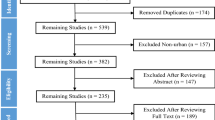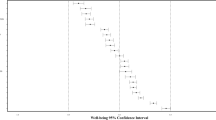Abstract
The literature on happiness or subjective well-being has explored the determinants of happiness without taking into consideration the role that water plays. In this paper we attempt to draw attention to water in subjective well-being studies. Approximately one hundred million people do not have access to water. A lack of clean water causes diseases such as diarrhea and cholera, responsible for around 5% of the total deaths in the world. Access to water should therefore be a necessary asset in life. In order to consider access to water, we estimate its influence on subjective well-being using data from rural Yucatan, Mexico. Residents in Yucatan suffer from low quality access to water and there are also imperfections in the management of the service, such as water cuts. We estimate the influence of water on subjective well-being, finding a positive and significant relationship. In a second stage of the research, we relate water access variables to subjective well-being, the health and the water domain of life, finding significant results. These results make it possible to formulate political measures concerning access to water and happiness maximization. We demonstrate that access to water is important for well-being in Yucatan and might be important in many other places; we therefore encourage future research to contemplate water satisfaction and water variables in their analysis.

Similar content being viewed by others
Notes
In this research we use interchangeably the terms happiness, subjective well-being and life satisfaction.
‘Cenote’ is a term used in the Yucatan Peninsula, which comes from the Mayan word ‘dzonot’, which means "abyss". For the ancient Mayans, before the arrival of conquerers, ‘cenotes’ were the main sources of water, as well as important spaces for ceremonial activities.
References
Bates, B. C., Kundzewicz, Z. W., Wu, S., & Palutikof, J. P. (Eds.) (2008). Climate change and water. Technical Paper of the Intergovernmental Panel on Climate Change, IPCC Secretariat, Geneva, Switzerland, pp. 210.
Batten, D. F. (2007). Can economists value water’s multiple benefits? Water Policy, 9(4), 345–362.
Beverage Marketing Corporation. (2009). The global water bottled market. 2008 Edition. New York, USA: Beverage Marketing Corporation.
Biswas, A. K. (2006). Water management for major urban centres. International Journal of Water Resources Development, 22(2), 183–197.
Biswas, A. K. (2007). Quo vadis, world of water? In J. Binde (Ed.), Making peace with the earth: What future for the human species and the planet?. New York, USA: UNESCO Publishing.
Biswas-Diener, R., & Diener, E. (2001). Making the best of a bad situation: Satisfaction in the slums of Calcuta. Social Indicators Research, 55, 329–352.
Bookwalter, J. T., & Dalenberg, D. R. (2004). Subjective well-being and household factors in South Africa. Social Indicators Research, 65, 333–353.
CONAGUA. (2008). Estadísticas del Agua en México. Edición 2008, Secretaría del Medio Ambiente y Recursos Naturales. México, D.F.: CONAGUA.
Cummins, R. A. (1996). The domains of life satisfaction: An attempt to order chaos. Social Indicators Research, 38, 303–332.
Di Tella, R., MacCulloch, R. J., & Oswald, A. J. (2001). Preferences over inflation and unemployment, evidence from surveys of subjective well-being. American Economic Review, 91, 335–341.
Di Tella, R., MacCulloch, R. J., & Oswald, A. J. (2006). The macroeconomics of happiness. The Review of Economics and Statistics, 85(4), 809–827.
Easterlin, R. A. (1974). Does economic growth improve the human lot? Some empirical evidence. In P. A. David & M. W. Reder (Eds.), Nations and households in economic growth. Essays in honor of Moses Abramowitz. New York, USA: Academic Press.
Easterlin, R. A. (2001). Income and happiness: Towards a unified theory. The Economic Journal, 111(473), 465–484.
Ferrer-i-Carbonell, A., & Gowdy, J. W. (2006). Environmental degradation and happiness. Ecological Economics, 60, 509–516.
González-Gómez, F., Guardiola, J., & García-Muñoz, T. M. (2009). The link between water access and subjective well-being: some methods and proposals. Working Paper 09/02. The Papers. Department of Theory and Economic History of the University of Granada.
Gonzalez-Gomez, F., Guardiola, J., & Lendechy-Grajales, A. (2011). The challenges of water access in Yucatán, México. Municipal Engineer. (In Press).
Guardiola, J., González-Gómez, F., & Lendechy-Grajales, A. (2010). Is access to water as good as the data claim? Case study of Yucatán. International Journal of Water Resources Development., 26(2), 219–233.
Hope, R. A. (2006). Evaluating water policy scenarios against the priorities of the rural poor. World Development, 34(1), 167–179.
INEGI. (2009). Estadísticas a propósito del día mundial del agua. Datos nacionales. México, D.F.: INEGI.
Kingdon, G. G., & Knight, J. (2006). Subjective well-being poverty vs. income poverty and capabilities poverty? The Journal of Development Studies, 42(7), 1199–1224.
Pacheco Ávila, J., Cabrera Sansores, A., & Pérez Ceballos, R. (2004). Diagnóstico de la calidad del agua subterránea en los sistemas municipales de abastecimiento en el Estado de Yucatán, México. Ingeniería, 8(2), 165–179.
Rojas, M. (2006). Life satisfaction and satisfaction in domains of life: Is it a simple relationship? Journal of Happiness Studies, 7(4), 467–497.
Rojas, M. (2007). Heterogeneity in the relationship between income and happiness: A conceptual referent theory explanation. Journal of Economic Psychology, 28(1), 1–14.
Rojas, M. (2008). Experienced poverty and income poverty in Mexico: A subjective well-being approach. World Development, 36(6), 1078–1093.
SAGARPA. (2011). Diagóstico del sector agrupecuario, pesquero y rural en el estado de Yucatán. Mérida, Yucatan: SAGARPA.
Showers, K. B. (2002). Water scarcity and urban Africa: An overview of urban–rural water linkages. World Development, 30(4), 621–648.
UNDP. (2006). Human development report 2006. Beyond scarcity: Power, poverty and the global water crisis. New York, USA: UNDP.
Van Praag, B. M. S., Frijters, P., & Ferrer-i-Carbonell, A. (2003). The anatomy of subjective well-being. Journal of Economic Behavior & Organization, 51(1), 29–49.
Welsch, H. (2006). Environment and happiness: Valuation of air pollution using life satisfaction data. Ecological Economics, 58, 801–813.
WHO, & UNICEF. (2005). Water for life: Making it happen. Geneva, Switzerland: WHO/UNICEF.
WHO, & UNICEF. (2010). Progress on sanitation and drinking-water. New York, USA: WHO/UNICEF.
Acknowledgments
The authors would like to thank the comments made by the participants in the 1st Workshop on the Economics of Water that have benefited this research. More specifically, we would like to thank Asit K. Biswas and Cecilia Tortajada for their useful observations. We also acknowledge the financial support from the Spanish Ministerio de Ciencia e Innovación (project ECO2009-08824/ECON and SEJ2007-62081/ECON) and Junta de Andalucía (P07-SEJ-02547).
Author information
Authors and Affiliations
Corresponding author
Rights and permissions
About this article
Cite this article
Guardiola, J., González-Gómez, F. & Lendechy Grajales, Á. The Influence of Water Access in Subjective Well-Being: Some Evidence in Yucatan, Mexico. Soc Indic Res 110, 207–218 (2013). https://doi.org/10.1007/s11205-011-9925-3
Accepted:
Published:
Issue Date:
DOI: https://doi.org/10.1007/s11205-011-9925-3




